|
Global equities gyrated on the continuing Greek saga, the FOMC announcement and forecast and the surprise release of oil reserves by the International Energy Agency. At week’s end, shares in the Asia Pacific region were up with the exception of the Taiex. However, equities in Europe and the UK declined while those in the U.S. were mixed. Overall gains ranged from 0.1 percent (KCLI) to 3.9 percent (Shanghai Composite). Losses ranged from 0.2 percent (S&P 500) 1.2 percent (Taiex).
IEA releases reserves
 The International Energy Agency (IEA) shocked markets Thursday when it announced a drawdown of strategic petroleum stocks. It said that it would release up to 60 million barrels. The IEA’s press release made it clear that the main reason for the coordinated release by its members was to make up for the loss of oil supply that has accompanied civil disorder in Libya. Exports effectively stopped in February. According to IEA, a total of 132 million barrels of Libyan crude have been lost to markets. The high quality of Libyan oil made the disruption of exports especially painful for international markets. No OPEC country has high enough quality crude in surplus to replace the Libyan supply. The International Energy Agency (IEA) shocked markets Thursday when it announced a drawdown of strategic petroleum stocks. It said that it would release up to 60 million barrels. The IEA’s press release made it clear that the main reason for the coordinated release by its members was to make up for the loss of oil supply that has accompanied civil disorder in Libya. Exports effectively stopped in February. According to IEA, a total of 132 million barrels of Libyan crude have been lost to markets. The high quality of Libyan oil made the disruption of exports especially painful for international markets. No OPEC country has high enough quality crude in surplus to replace the Libyan supply.
The IEA’s action comes on the heels of OPEC’s June 8th meeting. There was a split between the countries with surplus production capacity — Saudi Arabia, Kuwait and the UAE — and the others on the need for higher output. On Friday, Asian nations moved to release emergency oil stockpiles as part of a rare global coordinated action by consumer countries to prevent high energy prices from stunting a stuttering economic recovery. The stock release is only the third in the 37-year history of the agency that was set up as a counter weight to exporting group OPEC. The two other times reserves have been tapped were after hurricane Katrina in 2005 and in 1991 after the first Gulf war.
|
|
2010 |
2011 |
% Change |
|
Index |
Dec. 31 |
June 17 |
June 24 |
Week |
Year |
| Asia/Pacific |
|
|
|
|
|
|
| Australia |
All Ordinaries |
4846.9 |
4551.1 |
4565.0 |
0.3% |
-5.8% |
| Japan |
Nikkei 225 |
10228.9 |
9351.4 |
9678.7 |
3.5% |
-5.4% |
|
Topix |
898.8 |
805.3 |
833.2 |
3.5% |
-7.3% |
| Hong Kong |
Hang Seng |
23035.5 |
21695.3 |
22172.0 |
2.2% |
-3.7% |
| S. Korea |
Kospi |
2051.0 |
2031.9 |
2090.8 |
2.9% |
1.9% |
| Singapore |
STI |
3190.0 |
3005.3 |
3066.9 |
2.0% |
-3.9% |
| China |
Shanghai Composite |
2808.1 |
2642.8 |
2746.2 |
3.9% |
-0.5% |
|
|
|
|
|
|
|
| India |
Sensex 30 |
20509.1 |
17870.5 |
18240.7 |
2.1% |
-11.1% |
| Indonesia |
Jakarta Composite |
3703.5 |
3722.3 |
3848.6 |
3.4% |
3.9% |
| Malaysia |
KLCI |
1518.9 |
1563.4 |
1564.7 |
0.1% |
3.0% |
| Philippines |
PSEi |
4201.1 |
4153.1 |
4291.4 |
3.3% |
2.1% |
| Taiwan |
Taiex |
8972.5 |
8636.1 |
8532.8 |
-1.2% |
-4.9% |
| Thailand |
SET |
1032.8 |
1019.0 |
1022.9 |
0.4% |
-1.0% |
|
|
|
|
|
|
|
| Europe |
|
|
|
|
|
|
| UK |
FTSE 100 |
5899.9 |
5714.9 |
5697.7 |
-0.3% |
-3.4% |
| France |
CAC |
3804.8 |
3823.7 |
3784.8 |
-1.0% |
-0.5% |
| Germany |
XETRA DAX |
6914.2 |
7164.1 |
7121.4 |
-0.6% |
3.0% |
|
|
|
|
|
|
|
| North America |
|
|
|
|
|
|
| United States |
Dow |
11577.5 |
12004.4 |
11934.6 |
-0.6% |
3.1% |
|
NASDAQ |
2652.9 |
2616.5 |
2652.9 |
1.4% |
0.0% |
|
S&P 500 |
1257.6 |
1271.5 |
1268.5 |
-0.2% |
0.9% |
| Canada |
S&P/TSX Comp. |
13443.2 |
12790.0 |
12908.9 |
0.9% |
-4.0% |
| Mexico |
Bolsa |
38550.8 |
35025.7 |
35347.9 |
0.9% |
-8.3% |
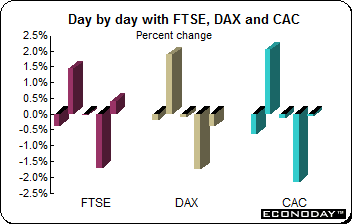 European and UK equities slumped last week as investors remained unconvinced that sovereign debt problems will be contained to Greece. Trading gyrated between positive and negative. The Greek Parliament is scheduled to vote June 28th on a 5-year austerity plan approved by the European Union, European Central Bank and International Monetary Fund. Analysts say the Greek parliament is likely to adopt major budget reforms in a close vote, triggering an expanded installment of funding designed to prevent a wider sovereign debt crisis. Still, the markets remain jittery about banking stocks due to their exposure in the event a Greek default sets off a chain reaction. On the week, the FTSE, DAX and CAC were 0.3 percent, 0.6 percent and 1.0 percent lower. European and UK equities slumped last week as investors remained unconvinced that sovereign debt problems will be contained to Greece. Trading gyrated between positive and negative. The Greek Parliament is scheduled to vote June 28th on a 5-year austerity plan approved by the European Union, European Central Bank and International Monetary Fund. Analysts say the Greek parliament is likely to adopt major budget reforms in a close vote, triggering an expanded installment of funding designed to prevent a wider sovereign debt crisis. Still, the markets remain jittery about banking stocks due to their exposure in the event a Greek default sets off a chain reaction. On the week, the FTSE, DAX and CAC were 0.3 percent, 0.6 percent and 1.0 percent lower.
Shares were weighed down during the week by global growth worries as well. Disappointing economic data and Fed Chairman Ben Bernanke’s sober outlook for the U.S. economy dispirited investors and spurred them to seek safe harbors. But worries about sovereign debt remained at the forefront ahead of a meeting of European Union leaders in Brussels on Thursday and Friday. Investors are likely to remain on edge until Tuesday’s vote in Athens on further austerity measures. 'Cyclical' stocks — or those sensitive to economic events, political risks and the business cycle — were battered most as investors continued to fret over lenders' exposure to Greece's sovereign debt problems. ECB president Jean Claude Trichet warned that instability risks in the European banking system were extremely high.
Mario Draghi has been appointed to be the next president of the European Central Bank for an eight year term. He will be replacing the current president, Jean Claude Trichet. Draghi's term begins November 1, 2011. He is currently the governor of the Bank of Italy. He is also a member of the ECB's governing council.
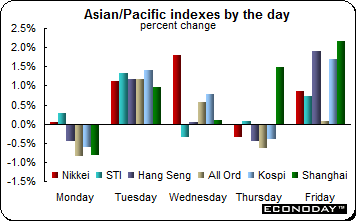 Most equities were up last week, despite their volatility from day to day. Investor sensitivity to risk here was no different than in Europe and North America. Stocks were up when Greece reached a deal with international lenders on an austerity plan. Shares were up as well following the IEA’s announcement that it would release emergency oil stockpiles, offsetting escalating worries about global growth. Growth worries surged to the fore after the Federal Reserve’s policy announcement and press conference Wednesday. Lower oil prices should ease inflationary pressures and support growth in many emerging economies such as China and India. On the week, only the Taiex declined. Gains ranged from 0.1 percent (KLCI) to 3.9 percent (Shanghai Composite). Most equities were up last week, despite their volatility from day to day. Investor sensitivity to risk here was no different than in Europe and North America. Stocks were up when Greece reached a deal with international lenders on an austerity plan. Shares were up as well following the IEA’s announcement that it would release emergency oil stockpiles, offsetting escalating worries about global growth. Growth worries surged to the fore after the Federal Reserve’s policy announcement and press conference Wednesday. Lower oil prices should ease inflationary pressures and support growth in many emerging economies such as China and India. On the week, only the Taiex declined. Gains ranged from 0.1 percent (KLCI) to 3.9 percent (Shanghai Composite).
On Thursday, the major stock markets ended mostly lower with concerns over the U.S. economy back in focus after a cautious outlook from Fed Chairman Ben Bernanke. Asian shares had mostly gained over the previous two sessions as the threat of a Greek sovereign default appeared to ease. However, optimism evaporated somewhat Thursday after Mr. Bernanke said that some factors driving the recent slowdown in the U.S. economy may persist into 2012.
The Shanghai Composite jumped 2.1 percent on Friday — its biggest daily rise since mid-February — after Chinese Premier Wen Jiabao said that inflation would be kept firmly under control this year. Similarly, India's Sensex soared 2.9 percent Friday, as a sharp drop in crude prices eased inflation and interest rate worries. The Sensex was up 2.1 percent for the week.
Reserve Bank of Australia
The Reserve Bank of Australia released the minutes of its June 7th meeting. The Board decided it was prudent to leave its interest rate unchanged at 4.75 percent where it has been since November 2010 but the outlook suggested that at some point a rate increase would be needed. They thought downside risks on the international side are more prominent, citing the European debt crisis. Domestically, inflation in the first quarter was in the bottom half of the RBA’s target range in underlying terms, partly due to disinflationary effects of the higher value of the Australian dollar and earlier moderation in labour costs. The Board said “If the economy evolved in line with the staff forecasts, GDP growth would be somewhat above trend over the next few years, led by growth in the resources sector.” A gradual pick-up in inflation could be expected under this scenario.
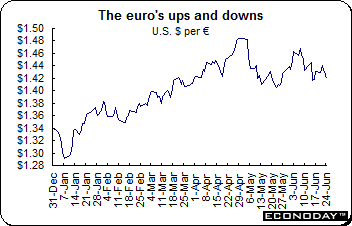 The U.S. dollar was up against most of its major counterparts last week. The euro bounced around as the saga of the Greek negotiations for bailout proceeded. The pound slumped after the Bank of England said in its meeting minutes that downside risks to the medium term inflation outlook had increased and the majority of monetary policy board members suggested that the current weakness in demand growth was likely to persist for longer than previously anticipated. Few now anticipate any move on official interest rates until much later in the year. The U.S. dollar was up against most of its major counterparts last week. The euro bounced around as the saga of the Greek negotiations for bailout proceeded. The pound slumped after the Bank of England said in its meeting minutes that downside risks to the medium term inflation outlook had increased and the majority of monetary policy board members suggested that the current weakness in demand growth was likely to persist for longer than previously anticipated. Few now anticipate any move on official interest rates until much later in the year.
The euro declined against the majority of its 16 most traded counterparts amid speculation a Greek austerity plan and a European Union pledge to stabilize the region’s economy won’t resolve its sovereign debt crisis. A lawmaker from Greece’s ruling party said he has not decided to vote for the country’s new fiscal measures and Italian bank stocks slumped amid concern the crisis may spread. Greek lawmakers must approve the €78 billion austerity package in Tuesday’s vote to receive a fifth loan payment under an existing bailout as well as future financing. Failure to secure aid would push Greece to the brink of default, with the country needing the funds to cover €6.6 billion of maturing bonds in August. European finance chiefs will decide on July 3 whether Greece has met conditions for its next aid payment.
Moody’s said Thursday that it may downgrade 13 Italian banks because they would be vulnerable to a cut in the government’s credit rating. The firm said last week Italy’s ratings may be cut because of slowing economic growth and the potential for Europe’s debt crisis to drive up borrowing costs.
Selected currencies — weekly results
|
|
2010 |
2011 |
% Change |
|
|
Dec 31 |
June 17 |
June 24 |
Week |
2011 |
| U.S. $ per currency |
|
|
|
|
|
|
| Australia |
A$ |
1.022 |
1.061 |
1.050 |
-1.1% |
2.7% |
| New Zealand |
NZ$ |
0.779 |
0.812 |
0.810 |
-0.3% |
4.0% |
| Canada |
C$ |
1.003 |
1.020 |
1.014 |
-0.6% |
1.1% |
| Eurozone |
euro (€) |
1.337 |
1.430 |
1.418 |
-0.9% |
6.1% |
| UK |
pound sterling (£) |
1.560 |
1.618 |
1.596 |
-1.3% |
2.3% |
|
|
|
|
|
|
|
| Currency per U.S. $ |
|
|
|
|
|
|
| China |
yuan |
6.607 |
6.476 |
6.474 |
0.0% |
2.1% |
| Hong Kong |
HK$* |
7.773 |
7.790 |
7.790 |
0.0% |
-0.2% |
| India |
rupee |
44.705 |
44.866 |
44.995 |
-0.3% |
-0.6% |
| Japan |
yen |
81.230 |
80.019 |
80.485 |
-0.6% |
0.9% |
| Malaysia |
ringgit |
3.064 |
3.044 |
3.040 |
0.1% |
0.8% |
| Singapore |
Singapore $ |
1.283 |
1.233 |
1.238 |
-0.5% |
3.6% |
| South Korea |
won |
1126.000 |
1086.900 |
1078.750 |
0.8% |
4.4% |
| Taiwan |
Taiwan $ |
29.299 |
28.962 |
28.886 |
0.3% |
1.4% |
| Thailand |
baht |
30.060 |
30.525 |
30.695 |
-0.6% |
-2.1% |
| Switzerland |
Swiss franc |
0.934 |
0.849 |
0.838 |
1.3% |
11.4% |
| *Pegged to U.S. dollar |
|
|
|
|
|
|
| Source: Bloomberg |
|
|
|
|
|
|
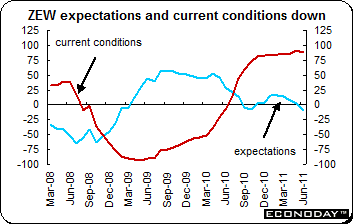 June ZEW survey shows that analysts have become rather more cautious about both the current and expected state of the German economy this month. The current conditions index dropped 4 points to 87.6 — its first monthly decline since May 2009. At the same time, the more closely watched expectations measure slumped more than 12 points to minus 9.0, its lowest reading since January 2009 and its fourth consecutive monthly decline. The relative weakness of the survey compared with May is in part attributed to uncertainties over the ongoing fiscal crisis in Greece and in particular its potential impact on the German banking sector. ZEW also cites evidence of slower growth in the U.S. as an important factor. June ZEW survey shows that analysts have become rather more cautious about both the current and expected state of the German economy this month. The current conditions index dropped 4 points to 87.6 — its first monthly decline since May 2009. At the same time, the more closely watched expectations measure slumped more than 12 points to minus 9.0, its lowest reading since January 2009 and its fourth consecutive monthly decline. The relative weakness of the survey compared with May is in part attributed to uncertainties over the ongoing fiscal crisis in Greece and in particular its potential impact on the German banking sector. ZEW also cites evidence of slower growth in the U.S. as an important factor.
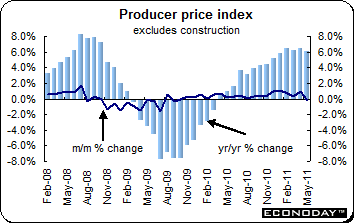 May producer prices were unchanged on the month and up 6.1 percent on the year. The key to the stable overall index was petroleum product prices which dropped 1.3 percent from April, although they were still nearly 15 percent higher on the year. Intermediates were unchanged on the month and up 5.7 percent from the year before. A drop on the month in metals (1.4 percent) essentially cancelled out gains in both chemicals (0.4 percent) and plastics (0.7 percent). Prices of nondurable goods were up 0.6 percent on the month with food 0.5 percent higher. Coffee prices jumped 2.2 percent and meat was up 0.9 percent. At the same time, commodity costs were 3.5 percent firmer on the year and capital goods 1.3 percent more expensive. May producer prices were unchanged on the month and up 6.1 percent on the year. The key to the stable overall index was petroleum product prices which dropped 1.3 percent from April, although they were still nearly 15 percent higher on the year. Intermediates were unchanged on the month and up 5.7 percent from the year before. A drop on the month in metals (1.4 percent) essentially cancelled out gains in both chemicals (0.4 percent) and plastics (0.7 percent). Prices of nondurable goods were up 0.6 percent on the month with food 0.5 percent higher. Coffee prices jumped 2.2 percent and meat was up 0.9 percent. At the same time, commodity costs were 3.5 percent firmer on the year and capital goods 1.3 percent more expensive.
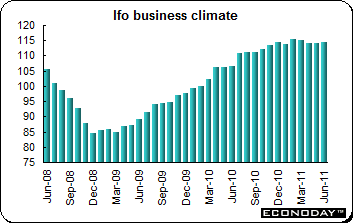 June Ifo economic sentiment edged up to 114.5 from 114.2 in May. The headline gain was attributable to stronger current conditions where the sub-index extended its upward trend with a near-2 point advance to 123.3. At the same time the expectations component was down for the fourth consecutive month, declining to 106.3 and its lowest reading in more than a year. By sector, morale in manufacturing was essentially unchanged at 27.7 and was lower in both retail (11.5 from 15.1) and services (26.4 from 27.4). However, losses here were more than compensated for by higher confidence in construction (minus 2.0 after minus 5.6) and wholesale (21.5 after 17.1). June Ifo economic sentiment edged up to 114.5 from 114.2 in May. The headline gain was attributable to stronger current conditions where the sub-index extended its upward trend with a near-2 point advance to 123.3. At the same time the expectations component was down for the fourth consecutive month, declining to 106.3 and its lowest reading in more than a year. By sector, morale in manufacturing was essentially unchanged at 27.7 and was lower in both retail (11.5 from 15.1) and services (26.4 from 27.4). However, losses here were more than compensated for by higher confidence in construction (minus 2.0 after minus 5.6) and wholesale (21.5 after 17.1).
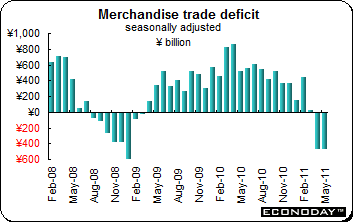 May unadjusted merchandise trade balance was in deficit for the second month. The trade deficit was Y853.7 billion – analysts expected a deficit of Y711.1 billion. Exports dropped 10.3 percent while imports jumped 12.3 percent. On a seasonally adjusted basis, the May deficit was Y474.6 billion after a deficit of Y469.6 in April. On the month, exports were up 2.5 percent but down 9.3 percent on the year while imports were up 2.4 percent and 8.6 percent on the year. On an unadjusted basis, exports to Asia dropped 8.7 percent on the year and declined 8.1 percent to China while exports to the U.S. plunged 14.6 percent. Exports to the EU were down 8.8 percent. Production capacity and supply chains were heavily destroyed by the March 11th earthquake and have not yet recovered crimping Japan’s ability to export. The last time Japan posted consecutive monthly trade deficits was during a four month period through January 2009, when demand for Japanese cars and electronics plunged at the height of the global credit crisis. May unadjusted merchandise trade balance was in deficit for the second month. The trade deficit was Y853.7 billion – analysts expected a deficit of Y711.1 billion. Exports dropped 10.3 percent while imports jumped 12.3 percent. On a seasonally adjusted basis, the May deficit was Y474.6 billion after a deficit of Y469.6 in April. On the month, exports were up 2.5 percent but down 9.3 percent on the year while imports were up 2.4 percent and 8.6 percent on the year. On an unadjusted basis, exports to Asia dropped 8.7 percent on the year and declined 8.1 percent to China while exports to the U.S. plunged 14.6 percent. Exports to the EU were down 8.8 percent. Production capacity and supply chains were heavily destroyed by the March 11th earthquake and have not yet recovered crimping Japan’s ability to export. The last time Japan posted consecutive monthly trade deficits was during a four month period through January 2009, when demand for Japanese cars and electronics plunged at the height of the global credit crisis.
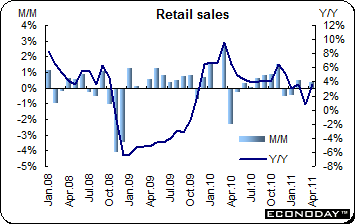 April retail sales were up 0.3 percent on the month and 3.6 percent on the year. The latest increase in nominal sales was boosted by higher prices with volumes only edging up a meager 0.2 percent from their level in March. Within cash sales, positive monthly growth was reported in six of the 11 major subsectors. Motor vehicle sales jumped 1.7 percent. Without autos, sales would have been flat on the month. Elsewhere sales of furniture & home furnishings jumped 3.2 percent, but most other advances were quite limited with gasoline (0.5 percent) and miscellaneous stores (0.6 percent) the only other winners of note. On the downside, building & outdoor equipment dropped a hefty 2.8 percent and both electronics and sports & hobbies declined 1.2 percent, the latter posting its fifth consecutive monthly decline. April retail sales were up 0.3 percent on the month and 3.6 percent on the year. The latest increase in nominal sales was boosted by higher prices with volumes only edging up a meager 0.2 percent from their level in March. Within cash sales, positive monthly growth was reported in six of the 11 major subsectors. Motor vehicle sales jumped 1.7 percent. Without autos, sales would have been flat on the month. Elsewhere sales of furniture & home furnishings jumped 3.2 percent, but most other advances were quite limited with gasoline (0.5 percent) and miscellaneous stores (0.6 percent) the only other winners of note. On the downside, building & outdoor equipment dropped a hefty 2.8 percent and both electronics and sports & hobbies declined 1.2 percent, the latter posting its fifth consecutive monthly decline.
Investor focus revolved around economic growth, sovereign debt woes and the surprise IEA release of petroleum reserves. As always, the FOMC statement and the ensuing press conference garnered heightened attention. New economic information was sparse.
New economic information will not be sparse this week. Final estimates of UK and French first quarter GDP are expected on Tuesday and Wednesday respectively. Eurozone June flash harmonized index of consumer prices is due Thursday along with M3 money supply. French consumer spending and producer prices will also be posted. Friday brings PMI manufacturing data for the eurozone and many of its members along with German retail sales. Also on the calendar are unemployment data for the eurozone and Italy.
| The following indicators will be released this week... |
| Europe |
|
|
| June 27 |
Germany |
Retail Sales (May) |
| June 28 |
UK |
Gross Domestic Product (Q1.2011 final) |
| June 29 |
EMU |
Business and Consumer Confidence (June) |
|
France |
Gross Domestic Product (Q1.2011 final) |
| June 30 |
EMU |
M3 Money Supply (May) |
|
|
Harmonized Index of Consumer Prices (June flash) |
|
Germany |
Unemployment (June) |
|
France |
Consumption of Manufactured Goods (May) |
|
|
Producer Price Index (May) |
| July 1 |
EMU |
Unemployment (May) |
|
|
PMI Manufacturing (June) |
|
|
|
| Asia/Pacific |
|
|
| June 28 |
Japan |
Retail Sales (May) |
| June 29 |
Japan |
Industrial Production (May) |
| July 1 |
Japan |
Consumer Price Index (May) |
|
|
Household Spending (May) |
|
|
Unemployment (May) |
|
|
Tankan Survey (Q2.2011 |
|
China |
PMI Manufacturing (June) |
|
|
|
| Americas |
|
|
| June 29 |
Canada |
Consumer Price Index (May) |
| June 30 |
Canada |
Monthly Gross Domestic Product (April) |
Anne D Picker is the author of International Economic Indicators and Central Banks.
|

